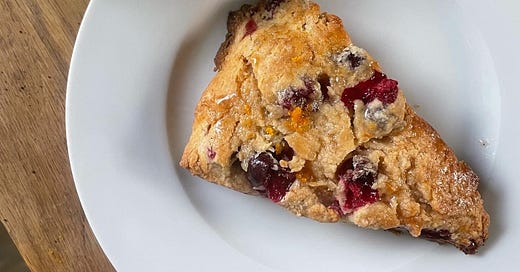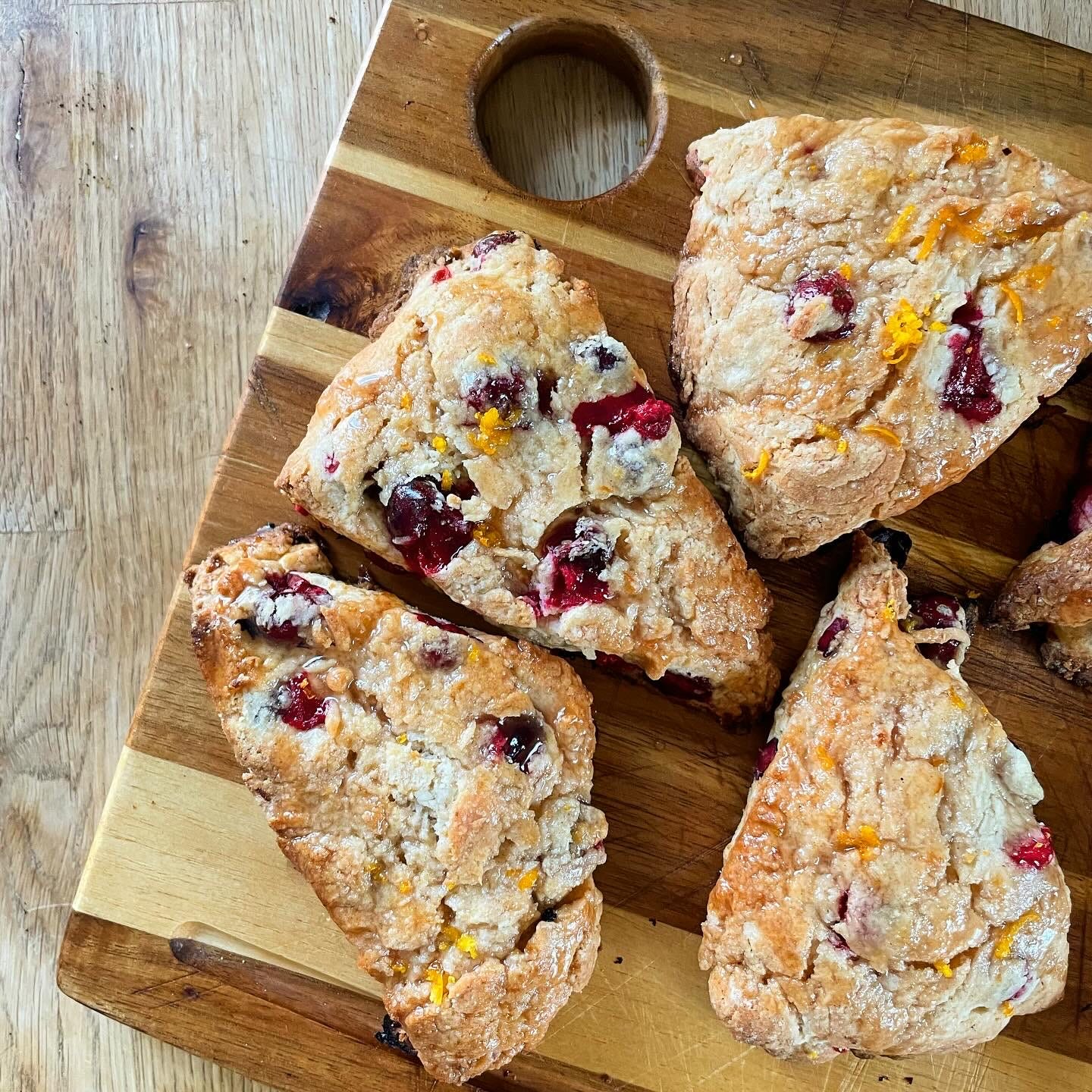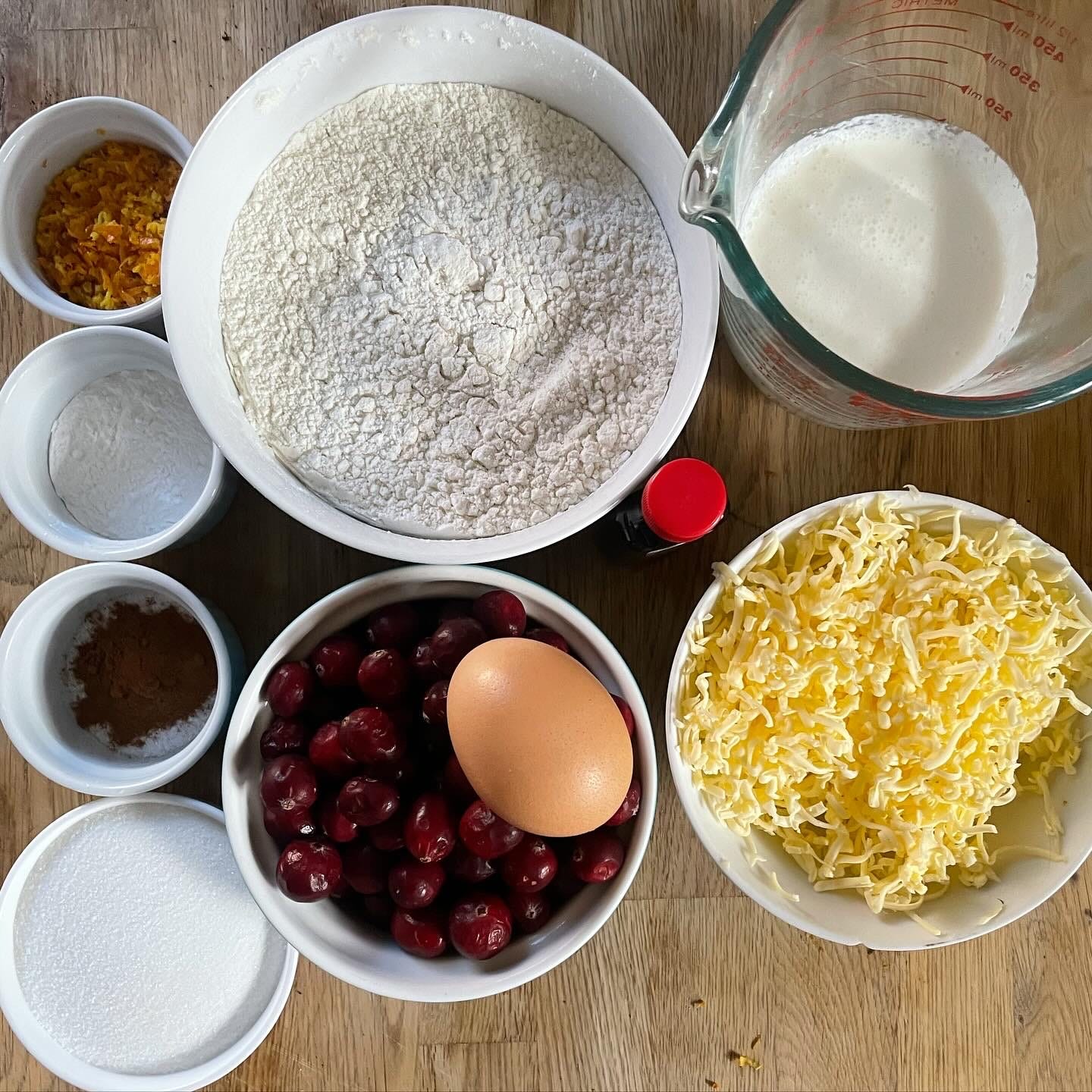Cranberry Blood Orange Scones
Apparently the key to baking is to freeze everything. Like, everything.
The ingredients:
For scones:
2 cups all-purpose flour
1/2 c. sugar
2.5 tsp. baking powder
.5 tsp salt
1 tbsp. cinnamon
1 blood orange, zested
1 stick unsalted butter, grated, then frozen
.5 c. heavy cream
2 large egg
1 tsp. vanilla extract
1.5 c. cranberries, frozen
For glaze:
2 tbsp. unsalted butter
2 tbsp. heavy cream
2 blood oranges, juiced and zest from one
1/2 c. sugar
The process:
Mix all dry ingredients together, until fully incorporated. Begin adding grated, frozen butter just a little bit at a time until it’s completely covered in flour. Make sure it’s not clumped. Add in half the blood orange zest. Place bowl back in freezer while working with wet ingredients. Mix cream, vanilla, and one egg together then combine with dry ingredients—just until incorporated. Then add cranberries and mold into a ball. Press ball into a circle and slice into eight equal slices. Preheat oven to 400. Place sliced scones into freezer for 15 minutes. Before putting into oven, brush with egg wash with remaining egg. Bake for 25 minutes.
While baking, combine blood orange juice with sugar. When warm, add butter and bring to a boil. After the boil, turn the heat off and add in the heavy cream and let sit. When scones are golden brown, top with remaining zest. Once glaze has cooled into a syrup, cover scones with syrup.
The story:
One of my biggest anxieties is that I’m not a great biscuit maker. My family was a Grands family, and my dad used to pop the biscuit container on my head, which—well, that explains a lot. The whole idea was that he would unwrap the biscuits so carefully, so not to have the explode. Then he would bop them right on the top of my head and they’d explode open. We’d bake them and then boom: biscuits. To be clear, we made the gravy from scratch. The sausage was also, typically, made ourselves or by a family friend, but the biscuits? We didn’t try it. Choose your battles, you know?
Since then, it’s been a mission of mine to figure it out. The pressure was increased when I started dating a Brit who loves scones. (Note: scones for Brits are biscuits, and per British rules, biscuits are cookies. For Americans, scones are certainly not biscuits, nor cookies. But scones are made most similarly to biscuits. Long story, short: I had my work cut out for me.) What I’ve tried to discover is how to make the most perfect biscuit and/or scone.
The trick, I’ve learned recently, is all in the baking powder, the butter, and the “working” of the dough. First off, make sure your baking powder is fresh, because much like us, baking powder grows tired and doesn’t want to do its thing. The butter (and honestly, as many ingredients and instruments as you can control) should be icy cold. And really? You want to touch the dough as little as possible.
All that said, I want to be honest—as I wrote this after having a little bit of whiskey. I’ve come to respect a workaround. I made these scones on a Sunday because I had the time and the wherewithal. I like this newsletter and speaking to the people who subscribe (by the way, thank you!!). But even more frankly, I think we get a bit too in our own bullshit about being “from scratch.” If the spirit moves you to have biscuits on a Saturday, but the spirit doesn’t move you to make them from scratch, then… I get the canned biscuit purchase. This is not a newsletter that’s going to shame you into being homemade. I just want to go along your journey with you.
If it’s delicious, then you did your job. But by God, if you want homemade cranberry scones with a blood orange glaze? These will cause a fight between your lips and your fingers because the latter can’t get the scones to the former quickly enough.






